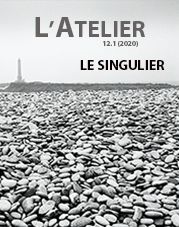"Singularity in its Mineral Actuality”: The Texture of Moral Life in Iris Murdoch’s The Sea, The Sea (1978)
Abstract
This paper looks at the way Iris Murdoch’s moral particularism—her vision of morality as a perception of particulars transcending general rules and classification—shapes her works of fiction, more specifically her 1978 Booker Prize winning novel The Sea, The Sea. Told from the perspective of Charles Arrowby, an egotistical theatre director who has withdrawn from the world in the seaside town of Narrowdean, the novel describes the different steps in Charles’s incomplete spiritual journey, from a self-centred world-view, based on the intimate conviction of his own exceptionality as an artist, to a partial awareness of the plurality of moral experience, from the limitations of a state of moral exception, based on his psychological ascendancy over others, to a partial acceptance of singularity (“singularité quelconque”). The liminal coastal scenery and the constantly shifting seascape, which at once isolate the character and open him up to the vast contingency of the world, embody this tension between the exceptionality of the egotistical self and the complexity of a sea of particulars.
Published
Issue
Section
License
- Work submitted for publication must be original, previously unpublished, and not under consideration for publication elsewhere. If previously published figures, tables, or parts of text are to be included, the copyright-holder's permission must have been obtained prior to submission.
- Authors of accepted manuscripts will assign to L'Atelier the right to electronically distribute their article, or publish it in any form (Internet, CD ROM, printed copy) but authors will retain copyright and, after the article has appeared in L'Atelier, authors may republish their text (in print and/or electronic form) as long as they clearly acknowledge L'Atelier as the original publisher.


